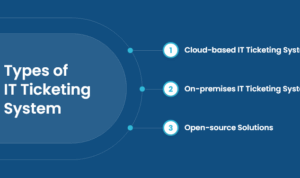Email ticketing systems have revolutionized the way businesses manage customer inquiries and support requests. By centralizing communication, these systems ensure that no query goes unanswered, enhancing customer satisfaction and operational efficiency. In a world where timely responses are crucial, email ticketing systems allow organizations to prioritize issues, track conversations, and maintain a history of interactions, making it easier to resolve problems swiftly.
Moreover, integrating these systems with other tools and platforms can greatly improve workflow, allowing for a more seamless experience for both customers and support teams. As companies increasingly rely on digital communication, understanding how email ticketing systems work becomes essential for anyone looking to improve their customer service strategy.
Technology has been an integral part of human civilization since the dawn of time. From the invention of the wheel to the advent of the internet, technological advancements have continually shaped our lifestyles, economies, and societies. This article embarks on a journey through the ages of technological evolution, exploring significant milestones, their impacts, and the future that lies ahead.
1. The Dawn of Technology
The very first instances of technology can be traced back to prehistoric times when early humans fashioned tools from stone, wood, and bone. The wheel, invented around 3500 BC, marked a monumental leap forward, facilitating trade and transport. This innovation was not just a tool; it symbolized the beginning of engineering as we know it today.
2. The Agricultural Revolution
Fast forward to around 10,000 BC, the Agricultural Revolution transformed human societies from nomadic tribes to settled agricultural communities. The domestication of plants and animals allowed for surplus food production, leading to the rise of civilizations. This era witnessed the development of plowing technology, irrigation systems, and storage facilities, which were crucial for sustaining larger populations.

3. The Industrial Revolution
The 18th century heralded the Industrial Revolution, a period characterized by dramatic shifts from hand production methods to machines. The steam engine, invented by James Watt in the late 1700s, revolutionized industries by increasing production capacity and efficiency. Factories sprouted, urbanizing populations as people flocked to cities for work. This era also saw advancements in textiles, metallurgy, and transportation, significantly impacting social structures and economic systems.
4. The Age of Electricity
The late 19th and early 20th centuries brought about the age of electricity, fundamentally altering daily life. Thomas Edison’s invention of the light bulb and Nikola Tesla’s development of alternating current (AC) systems paved the way for electrification. Homes and industries began to harness electrical power, leading to innovations in communication and transportation. The telephone, invented by Alexander Graham Bell, and the radio transformed how people connected across distances.
5. The Information Age
The mid-20th century introduced the Information Age, marked by the advent of computers and the internet. The first electronic computers emerged in the 1940s, paving the way for subsequent developments in digital technology. The invention of the microprocessor in the 1970s made computers accessible to the general public, culminating in the rise of personal computers.
In the 1990s, the World Wide Web was created by Tim Berners-Lee, revolutionizing how information was shared and consumed. This digital revolution transformed industries, economies, and personal interactions. Social media emerged, creating new platforms for communication and interaction, while e-commerce reshaped shopping experiences.
6. Mobile Technology and Connectivity
The 21st century ushered in the era of mobile technology, changing the landscape of communication and information access. The introduction of smartphones has placed a world of information at our fingertips, enabling instant communication and connectivity. Apps have transformed everyday tasks from banking to shopping, making life more convenient while raising questions about privacy and data security.
7. Artificial Intelligence and Automation
As we progress further into the 21st century, artificial intelligence (AI) and automation have emerged as pivotal technologies. From self-driving cars to AI-driven customer service, these advancements are reshaping industries. Machine learning and data analytics are enabling businesses to make informed decisions, while robotics are taking over repetitive tasks.

However, the rise of AI presents ethical dilemmas and challenges, particularly concerning job displacement and the need for a skilled workforce. Society must navigate these changes thoughtfully to ensure inclusive growth that benefits all.
8. Future Trends in Technology
Looking ahead, several trends are poised to reshape the technological landscape. The Internet of Things (IoT) is expanding, connecting everyday devices to the internet, enhancing automation and data collection. Augmented reality (AR) and virtual reality (VR) are set to revolutionize sectors such as gaming, healthcare, and education, offering immersive experiences that were once the stuff of science fiction.
Moreover, advancements in biotechnology promise breakthroughs in healthcare, nutrition, and environmental sustainability. Ethical considerations surrounding genetic engineering and data privacy will need to be addressed as these technologies develop.
9. Conclusion
The evolution of technology is a compelling narrative that reflects human ingenuity and adaptation. Each technological milestone has brought about profound changes, shaping our world in ways we often take for granted. As we stand on the cusp of further advancements, it is crucial to approach the future with a balanced perspective, embracing innovation while addressing the ethical and social implications that accompany it.
The journey of technology is far from over, and its trajectory will continue to influence every aspect of our lives.
10. Call to Action
As active participants in this ever-evolving technological landscape, it is essential for individuals and communities to stay informed and engaged. By understanding the past and the present, we can better prepare for the future, ensuring that technology serves as a tool for progress and inclusivity. Let us embrace the changes ahead with open minds and a commitment to ethical responsibility.
User Queries
What is an email ticketing system?
An email ticketing system is a software solution that manages customer inquiries and support requests via email, organizing them into tickets for efficient tracking and resolution.
How does an email ticketing system improve customer service?
It improves customer service by centralizing communication, prioritizing issues, and providing a historical record of interactions, allowing for quicker resolutions.
Can small businesses benefit from email ticketing systems?
Yes, small businesses can greatly benefit from email ticketing systems as they help streamline support processes, making it easier to manage customer interactions effectively.

Are email ticketing systems customizable?
Many email ticketing systems offer customization options to fit the specific needs of a business, including ticket categories, workflows, and automated responses.
What features should I look for in an email ticketing system?
Key features to look for include email integration, reporting and analytics, automation capabilities, and a user-friendly interface to ensure an efficient support process.


























